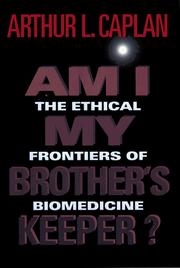| Listing 1 - 5 of 5 |
Sort by
|
Book
ISBN: 1282079301 9786612079306 0253113741 0585319197 9780585319193 9781282079304 6612079304 9780253113740 Year: 1997 Publisher: [Place of publication not identified] Indiana University Press
Abstract | Keywords | Export | Availability | Bookmark
 Loading...
Loading...Choose an application
- Reference Manager
- EndNote
- RefWorks (Direct export to RefWorks)
Medical ethics --- Bioethics. --- Ethics, Medical. --- Biomedical ethics --- Clinical ethics --- Ethics, Medical --- Health care ethics --- Medical care --- Medicine --- Bioethics --- Professional ethics --- Nursing ethics --- Social medicine --- Medical Ethics --- Professionalism --- Biomedical Ethics --- Health Care Ethics --- Ethics, Biomedical --- Ethics, Health Care --- Ethicists --- Moral and ethical aspects --- ethics --- Medical ethics.

ISBN: 1282075918 0253113245 9786612075919 058523423X 9780585234236 0253313074 9780253313072 9781282075917 9780253113245 6612075910 Year: 1992 Publisher: Bloomington : Indiana University Press,
Abstract | Keywords | Export | Availability | Bookmark
 Loading...
Loading...Choose an application
- Reference Manager
- EndNote
- RefWorks (Direct export to RefWorks)
Arthur L. Caplan has been an important voice in bioethics for many years. In a great number of essays and articles he has taken on some of the most pressing issues in bioethics today. This book brings his most important work together with new essays on autonomy in nursing homes and on the ethical issues raised by the mapping and sequencing of the human genome. In an introductory essay Caplan updates some of his views and responds to criticisms. Caplan begins with a discussion the nature of work in applied ethics. He rejects the view that those who do bioethics or any other version of applied ethics are merely the servants of moral theoreticians. Next, Caplan examines some of the tough moral questions raised by the use of animals in biomedical research. While not recognizing that animals have rights, he argues for more humane treatment when they are used in scientific research. In a group of essays on human experimentation, Caplan studies such issues as privacy and the obligation to serve as a voluntary subject in medical experimentation. In subsequent essays, he explores the frontiers of medicine in genetics, reproductive technology, and transplantation and reviews the challenges posed to the American health care system as the population grows older. Caplan concludes by confronting the pressing public policy issues of cost containment and rationing. He rejects the view that rationing is the only means available for reducing the escalating costs of health care and suggests strategies that would control costs while affording access to basic medical care for every American.
Medical ethics. --- Bioethics. --- Ethics, Medical. --- Biomedical Ethics --- Health Care Ethics --- Ethics, Biomedical --- Ethics, Health Care --- Ethics, Medical --- Ethicists --- Medical Ethics --- Medicine --- Professionalism --- Bioethics --- Biology --- Biomedical ethics --- Life sciences --- Life sciences ethics --- Science --- Clinical ethics --- Health care ethics --- Medical care --- Professional ethics --- Nursing ethics --- Social medicine --- ethics --- Moral and ethical aspects --- Human Genome Project.
Book
ISBN: 1461734053 9781461734055 Year: 2007 Publisher: Lanham, Maryland : Rowman & Littlefield,
Abstract | Keywords | Export | Availability | Bookmark
 Loading...
Loading...Choose an application
- Reference Manager
- EndNote
- RefWorks (Direct export to RefWorks)
What do you think about cloning, stem cell research, brain enhancement, or doing experiments on newly dead patients? Read Smart Mice, Not so Smart People and you'll know what Art Caplan thinks. But this assortment of pithy, provocative opinions on all things bioethical does more than simply give you a piece of the author's mind-it also invites and even dares you to make up your own.
Medical ethics. --- Biomedical ethics --- Clinical ethics --- Ethics, Medical --- Health care ethics --- Medical care --- Medicine --- Bioethics --- Professional ethics --- Nursing ethics --- Social medicine --- Moral and ethical aspects
Book
ISBN: 0191645052 142374330X 9781423743309 9780191724084 0191724084 Year: 2006 Publisher: New York : Oxford University Press,
Abstract | Keywords | Export | Availability | Bookmark
 Loading...
Loading...Choose an application
- Reference Manager
- EndNote
- RefWorks (Direct export to RefWorks)
Brain --- Neurosciences --- Cerebrum --- Mind --- Central nervous system --- Head --- Neural sciences --- Neurological sciences --- Neuroscience --- Medical sciences --- Nervous system --- Research --- Moral and ethical aspects.
Book
ISBN: 0190631953 0190211008 9780190211004 9780190210984 0190210982 9780190210991 0190210990 Year: 2017 Publisher: New York, New York : Oxford University Press,
Abstract | Keywords | Export | Availability | Bookmark
 Loading...
Loading...Choose an application
- Reference Manager
- EndNote
- RefWorks (Direct export to RefWorks)
Sports are more than just ""games."" They can unite countries, start wars, and revolutionize views on race, class, and gender. Through works from philosophy, sociology, medicine, and law, this collection explores intersections of sports and ethics, and identifies the immense role of sports in shaping and reflecting social values.
| Listing 1 - 5 of 5 |
Sort by
|

 Search
Search Feedback
Feedback About UniCat
About UniCat  Help
Help News
News